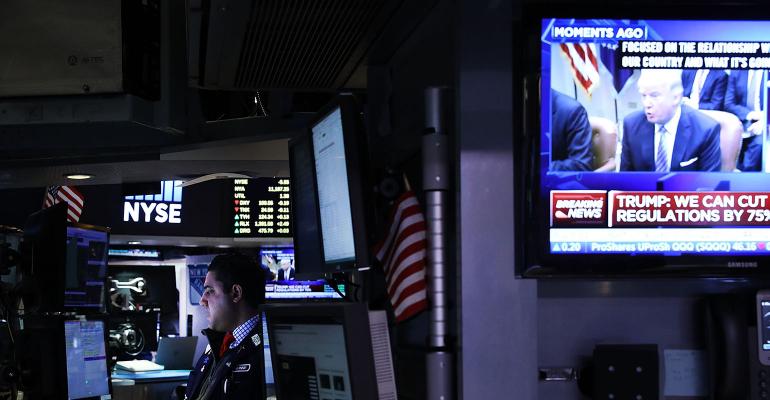By Love Liman
(Bloomberg) --There’s a Swedish hedge fund that’s doing very well as faith in the economic agenda of U.S. President Donald Trump dwindles.
Informed Portfolio Management (IPM), which manages $6.7 billion, has returned 9 percent so far this year in its main fund, the Systematic Macro Fund. Its head of investment strategy, Serge Houles, says it benefited from the so-called Trump reflation trade losing steam.
By comparison, Hedge Fund Research’s HFRX Macro Systematic Diversified CTA Index fell 3 percent over the same period. IPM beat peers tracked by Bloomberg such as GMO Systematic Global Macro Fund and Merrill Lynch’s AQR Global Relative Value Ucits Fund.
“Market participants are gradually pricing in a more difficult path to Trumponomics than expected, given the difficulties faced by Trump to pass measures so far,” Houles said.
When Trump won the U.S. presidential election last year, the expectation was that he’d force through an agenda of deregulation, massive infrastructure spending and tax cuts that would thrust the world’s largest economy into turbo mode. But four months into his presidency, a series of scandals appears to have stalled Trump’s legislative agenda, and forced markets into reverse as investors correct their earlier expectations.
And while the economic prospects of the U.S. economy are overshadowed by political uncertainty, Europe appears to be shaking off the worst moments of populism and its associated economic risks. Houles says “the risk of euro-skeptic politicians taking over in Europe is ebbing.” He pointed to election outcomes in France and the Netherlands as proof.
IPM made money on being positioned for gains in European equity markets relative to North America, Australia and Hong Kong. But it did best by being on the right side of currency markets, betting on gains in the euro and the yen. The fund has been short the New Zealand and Canadian dollars, the Swedish krona and a number of emerging-market currencies.
“Unsurprisingly, the stronger U.S. dollar and the risk rally from the end of last year were both detrimental, until the Trump-trade repricing caused a reversal in recent moves back in our favor on both the long and short side,” Houles said.
IPM relies on fundamental analysis and often takes a longer-term view, with positions being held on average for about one year. The fund is currently long U.S. Treasury notes and short U.K. government bonds, which are particularly prone to price swings given uncertainty surrounding Britain’s talks to exit the European Union.
“The contribution of the relative bond portfolio is still positive for the year as the interest rate spread between the U.S. versus Japan and the U.K. has started to normalize,” Houles said.
IPM also has a so-called directional portfolio, in which they are bearish bonds while holding a moderate bullish view on equities and being positioned for a global appreciation of emerging market currencies versus group-of-10 currencies.
--With assistance from Niklas Magnusson and Nishant Kumar.To contact the reporter on this story: Love Liman in Stockholm at [email protected] To contact the editors responsible for this story: Ven Ram at [email protected] Tasneem Hanfi Brögger, Jonas Bergman





